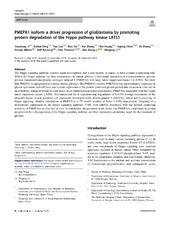| dc.contributor.author | Ji, Jianxiong | en_US |
| dc.contributor.author | Ding, Kaikai | en_US |
| dc.contributor.author | Luo, Tao | en_US |
| dc.contributor.author | Xu, Ran | en_US |
| dc.contributor.author | Zhang, Xin | en_US |
| dc.contributor.author | Huang, Bin | en_US |
| dc.contributor.author | Chen, An-Jing | en_US |
| dc.contributor.author | Zhang, Di | en_US |
| dc.contributor.author | Miletic, Hrvoje | en_US |
| dc.contributor.author | Bjerkvig, Rolf | en_US |
| dc.contributor.author | Thorsen, Frits | en_US |
| dc.contributor.author | Wang, Jian | en_US |
| dc.contributor.author | Li, Xingang | en_US |
| dc.date.accessioned | 2020-08-07T12:22:36Z | |
| dc.date.available | 2020-08-07T12:22:36Z | |
| dc.date.issued | 2019 | |
| dc.Published | Ji J, Ding K, Luo T, Xu R, Zhang X, Huang B, Chen A, Zhang D, Miletic H, Bjerkvig R, Thorsen F, Wang J, Li X. PMEPA1 isoform a drives progression of glioblastoma by promoting protein degradation of the Hippo pathway kinase LATS1. Oncogene. 2019;39:1125–1139 | eng |
| dc.identifier.issn | 0950-9232 | |
| dc.identifier.issn | 1476-5594 | |
| dc.identifier.uri | https://hdl.handle.net/1956/23565 | |
| dc.description.abstract | The Hippo signaling pathway controls organ development and is also known, in cancer, to have a tumor suppressing role. Within the Hippo pathway, we here demonstrate, in human gliomas, a functional interaction of a transmembrane protein, prostate transmembrane protein, androgen induced 1 (PMEPA1) with large tumor suppressor kinase 1 (LATS1). We show that PMEPA1 is upregulated in primary human gliomas. The PMEPA1 isoform PMEPA1a was predominantly expressed in glioma specimens and cell lines, and ectopic expression of the protein promoted glioma growth and invasion in vitro and in an orthotopic xenograft model in nude mice. In co-immunoprecipitation experiments, PMEPA1a associated with the Hippo tumor suppressor kinase LATS1. This interaction led to a proteasomal degradation of LATS1 through recruitment of the ubiquitin ligase, neural precursor cell expressed, developmentally downregulated 4 (NEDD4), which led to silencing of Hippo signaling. Alanine substitution in PMEPA1a at PY motifs resulted in failed LATS1 degradation. Targeting of a downstream component in the Hippo signaling pathway, YAP, with shRNA, interfered with the growth promoting activities of PMEPA1a in vitro and in vivo. In conclusion, the presented work shows that PMEPA1a contributes to glioma progression by a dysregulation of the Hippo signaling pathway and thus represents a promising target for the treatment of gliomas. | en_US |
| dc.language.iso | eng | eng |
| dc.publisher | Springer Nature | eng |
| dc.rights | Attribution CC BY | eng |
| dc.rights.uri | http://creativecommons.org/licenses/by/4.0 | eng |
| dc.title | PMEPA1 isoform a drives progression of glioblastoma by promoting protein degradation of the Hippo pathway kinase LATS1 | en_US |
| dc.type | Peer reviewed | |
| dc.type | Journal article | |
| dc.date.updated | 2020-01-28T09:54:28Z | |
| dc.description.version | publishedVersion | en_US |
| dc.rights.holder | Copyright 2019 The Author(s) | |
| dc.identifier.doi | https://doi.org/10.1038/s41388-019-1050-9 | |
| dc.identifier.cristin | 1760052 | |
| dc.source.journal | Oncogene | |

